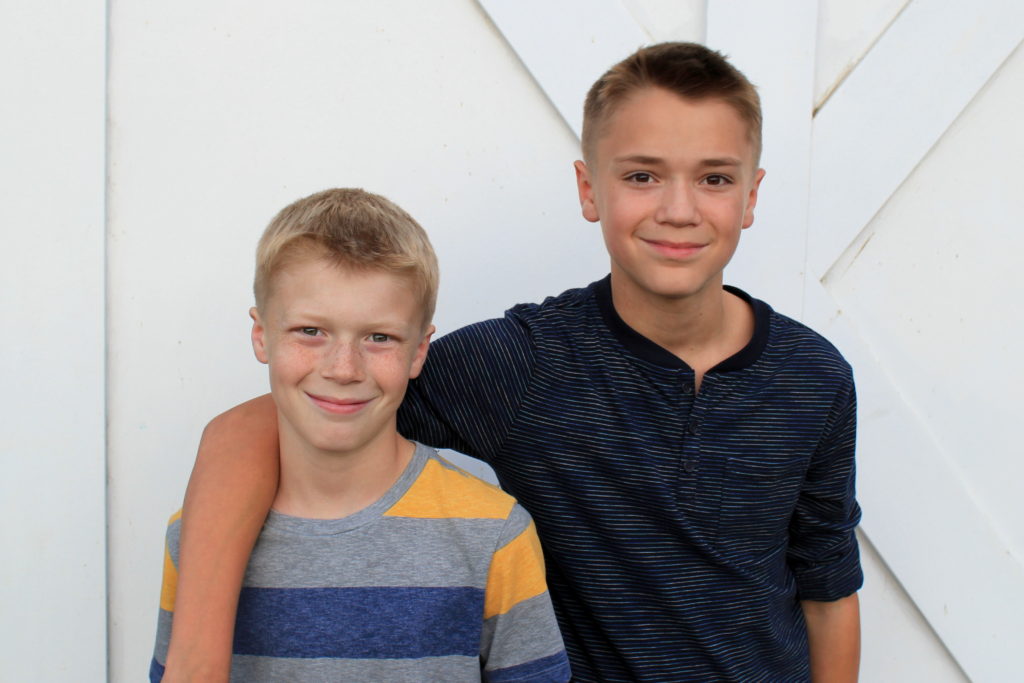Jan
27
Thirteen and ten
Filed Under Uncategorized | 28 Comments
Thirteen is long gangly limbs and a new-ish posture that somehow transcends the word slouch, it’s a full-bodied curve. I googled an old Snoopy cartoon where he’s pretending to be a vulture, perched like the letter C on the top of his doghouse. That’s YOU, his brother laughs. Thirteen curls even more in response, his entire being can become a grimace.
Thirteen is a short temper and dogged refusal to give a single inch, lighthearted conversations come to a boil in an instant and suddenly I’m ten minutes into an argument about something I don’t even care about and the topic keeps changing and what the hell, guy? STOP THAT. Thirteen is all strong opinions and withering judgments, an airy wave of the hand and a beetling of the brow.
Thirteen is also a grab-bag of sweet moments: a startling “Love you!” after a silent car ride, an unprompted texted apology, a door held for me. Thirteen has the capacity for pitch-perfect humor, when he can lay down the obnoxious sarcasm in favor of the far more subtle and hilarious observations that he delivers at exactly the right moment. Thirteen slings his long arms around me out of the blue. Moomz, he says, his pet name for me. Rolz, I say back, holding tight.
Thirteen is smart and headstrong and always, always listening. I think, I hope, that thirteen is absorbing the world like a sponge via that careless-seeming slouch, that everything is coalescing inside, a storm of who-am-I, and the shape taking form is one of confidence and maybe, just maybe, the willingness to see other perspectives.
Ten, who is going to be eleven in just a few days, is teetering precariously on the edge of small-boyhood. He is a glorious smattering of freckles and a wide grin that feels like mid-summer sunshine. He is full enthusiasm and absolute refusal in one labyrinthine package, a seesaw of uncomplicated joy and mysterious black clouds.
Ten cannot be budged from his snap judgements: the thing he’s never eaten before is awful, the place I suggested is lame. Ten is both enamored with the world around him — fascinated with cities and animals and faraway lands he wants to experience one day — and too caught up with his own preconceptions to allow the world to surprise him. He sees big, he sees through a pinhole; it’s like everything else for him: big and tiny, back and forth.
Ten is hugely affectionate and loves his family unreservedly. He is funny and silly and both enormously scatterbrained and deeply observant. He lights up like a Christmas tree over our shared rituals: inside jokes, secret gestures. His face has the soft planes of childhood while his ever-growing bones seem to knit before my eyes into the stance of the man he will become.
Ten is also smart and headstrong, and yet so different from thirteen. I hope the same for him, that he comes to believe in who he is without forming a carapace against the hurts and risks that come with being human. Real talk, I also want ten to be little forever and ever and ever. I will always be your littlest one, even if I’m bigger, he says with surprising wisdom, curling his fingers around mine.
Jan
7
The good fight
Filed Under Uncategorized | 34 Comments
When I was in rehab I had a counselor named Wilma who I adored. Everyone lucky enough to be assigned to her group adored her, except the people who were too overwhelmed by her, because she could be overwhelming. She had long greying ringlets and piercing eyes and wore a series of spunky tunics combined with brightly colored leggings and she accepted exactly zero bullshit. She was ruthless and sincere and she cared, she cared so much I wonder how she was able to survive a job that constantly cycled in people at their lowest point and sent them back into the world 28 short days later, held together with scotch tape and prayers.
She once told me she believed I would use my writing to help other addicts, she said she couldn’t wait to see the strong sober warrior I was going to become. It was profoundly kind of her to say that, at a time when I felt so unworthy, so ashamed and dispirited and un-warrior-like in every way.
Wilma was the very definition of a sober warrior, having fought her way back from the kind of rock-bottom addiction most people do not survive. She poured herself into service work, she said it was the only way she was able to stay clean. I don’t know how many people she has affected and helped over the years: hundreds? Thousands? She certainly made an impact on me.
For a brief time, I considered writing about sobriety in a more intentional way. I thought of a website dedicated to recovery, I thought about sharing my story more publicly, I thought of how I could take what I’ve gone through and transform my worst moments into opportunities to connect with others who have been there.
These worthy endeavors do not call to me, though. I want to write about addiction and recovery in a way that feels natural, like it’s part of me but not all of me. I don’t want to dedicate myself the way Wilma did, even though it makes me feel selfish to admit. I don’t want the focus of my life to be on this one aspect.
Wilma was dedicated to the 12-step program method of recovery. I have never been able to embrace AA, no matter how many times I tried. I think there are many paths; for some it’s a higher power, for me I most often rely on the “play the tape forward” trick to avoid triggers (ie; sure, that cold glass of hoppy IPA sounds good, but let’s go ahead and play the tape forward to the part where you’re hiding vodka bottles in the laundry hamper).
In lots of ways, I envy Wilma for her confidence. I wish I felt driven to help other addicts the way she did, to say “Here. Do this, and things will get better.” The only way I truly know to get better, though, is to stop doing the things that are making everything terrible, and getting from doing to stopping is — in my opinion — a complicated mental journey that works differently for everyone.
I don’t know if I have become any kind of warrior. I have had long stretches of sobriety and setbacks along the way. I have dumped all of my coping mechanisms into unhealthy food habits then wrestled myself back into uber-disciplined eating and exercising then repeated the cycle, over and over. I have peeled back my dysfunctional self-critical thinking to see the terrified protective mechanism that it is, I have felt my feelings and avoided my feelings and traded my feelings for other feelings. In all of my fumblings I have never felt particularly victorious, but I do feel here. I feel alive, I feel present, I feel human. I feel a thousand times more connected and hopeful than I did in those miserable days leading up to treatment.
Maybe being a warrior simply means that you don’t give up, no matter what, and to that end, I’ll accept the honor.


